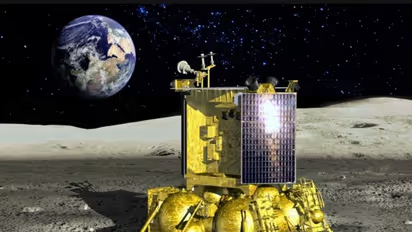How Russia's historic moon mission ended in a crash; details of final moments revealed

Synopsis
Russia's lunar aspirations have been shattered with the Luna-25 probe, the nation's inaugural lunar mission in nearly 50 years, meeting an unfortunate end as it crashed during pre-landing maneuvers on the Moon's surface.
Russia's hopes for a successful lunar mission were shattered as the Luna-25 probe, the country's first Moon mission in nearly fifty years, crashed during pre-landing maneuvers. This disappointing outcome was confirmed by Russia's space agency, Roscosmos, on Sunday. Roscosmos reported that communication with Luna-25 was abruptly lost at 2:57 pm (11:57 GMT), creating uncertainty about the mission's fate. Preliminary findings from the space agency indicated that "the apparatus moved into an unpredictable orbit and ceased to exist as a result of a collision with the surface of the Moon."
According to Roscosmos, the probe was attempting to execute a thrust to transfer it onto the pre-landing orbit when an emergency situation occurred onboard, preventing the maneuver from proceeding as planned.
"Thrust was released to transfer the probe onto the pre-landing orbit," Roscosmos said in a statement sharing details, adding: "During the operation, an emergency situation occurred on board the automatic station, which did not allow the carrying out of the manoeuvre within the specified conditions."
Despite efforts made on August 19 and 20 to locate the craft and reestablish contact, Roscosmos reported that these attempts were unsuccessful. The space agency also announced its intention to launch a ministerial investigation into the causes of the crash, although specific technical issues were not disclosed.
What Russia set out achieve
The Luna-25 probe, weighing 800 kilograms, aimed to achieve a historic soft landing on the lunar south pole, a feat never before accomplished. Russia's last attempt to land on a celestial body was in 1989, 47 years ago, when the Soviet Union's Phobos 2 probe, intended for the exploration of Mars' moons, failed due to an onboard computer malfunction.
In June of the same year, Yuri Borisov, the head of Roscosmos, acknowledged the mission's risks, estimating a roughly 70 percent chance of success. Luna-25 had made significant progress by successfully entering the Moon's orbit just days before following its launch from the Vostochny Cosmodrome.
The mission had ambitious objectives, including a year-long stay on the Moon, during which Luna-25 would collect soil samples and search for water. Cameras onboard the lander had already captured images of the lunar surface. This mission carried substantial promise for Russia as it aimed to build upon the legacy of its Soviet-era Luna program, particularly significant given the country's ongoing internal and external geopolitical challenges.
Also read: Russia's 1st lunar mission in 47 years fails as Luna-25 crashes into the moon
Russia's lunar mission failure coincided with India's competing space probe, Chandrayaan-3, successfully entering the Moon's orbit earlier in August. Similar to Luna-25, Chandrayaan-3's lander Vikram also aimed to land on the Moon's south pole. If India achieves its intended landing on August 23 at 6:40 PM, it will join the prestigious group of countries, including Russia, the United States, and China, that have previously achieved controlled lunar landings and will be the first to do so on the Moon's south pole.
Check the Breaking News Today and Latest News from across India and around the world. Stay updated with the latest World News and global developments from politics to economy and current affairs. Get in-depth coverage of China News, Europe News, Pakistan News, and South Asia News, along with top headlines from the UK and US. Follow expert analysis, international trends, and breaking updates from around the globe. Download the Asianet News Official App from the Android Play Store and iPhone App Store for accurate and timely news updates anytime, anywhere.